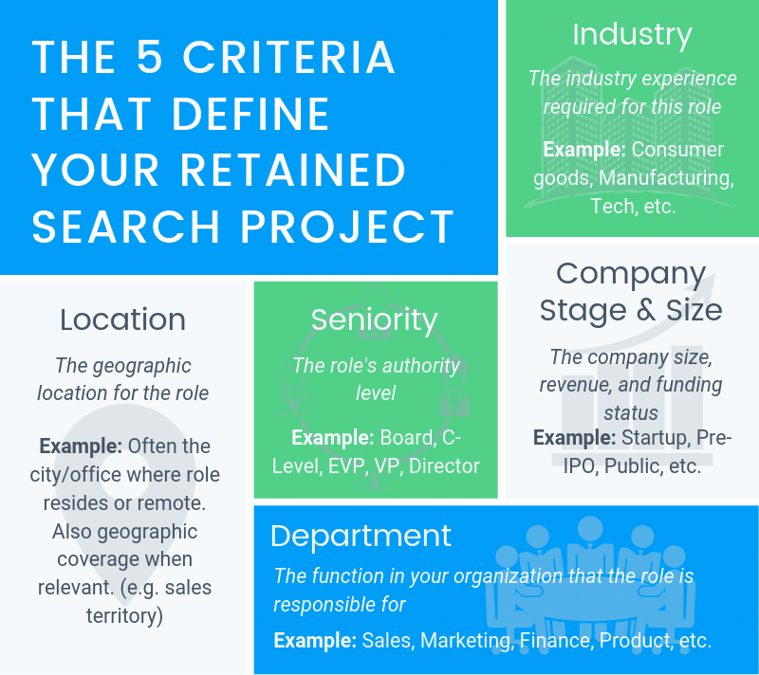The 5 Criteria That Define Your Executive Search
No two companies are the same, just like no two executive searches are going to be the same. You need an Executive Recruiter that understands the unique challenges that companies face so they can find you the best executive for the role you are looking to fill. Whether it's understanding what stage your company is in or simply knowing what kind of experience an executive in your industry should have, these criteria are all things to consider when hiring an Executive Recruiter.
The only way a recruiter is going to recognize the qualities you want in a key hire—and the only way they'll be able to find you a quality executive—is if they specialize. There are 5 areas of specialization in particular that you must consider before hiring an Executive Recruiter that will impact the way you conduct your executive search.
Company Size & Stage
The first of these 5 criteria is company size & stage. There are plenty of factors a company needs to think about when deciding to hire an Executive Recruiter that specializes in comparable companies including:
- Where are you now as a company?
- What is your revenue or plans for revenue?
- How much profit are you making?
- What does your company's growth look like?
- Is your company well established?
- Are you prepping your company for acquisition?
Take a senior executive from a major corporation for example. They have credentials, years of management experience, and an impressive record of providing exceptional value for their company. While they look great on paper and seem like a great contender for any company, you will likely see them fail if placed in a startup environment.
This result is because the environment in which an executive thrives can be narrow in scope. It goes without saying that you don't have the same environment in a startup that you do in a larger corporation. Your company should be working with a recruiter who knows how to account for the nuances of both environments so they can find you the right person.
Industry
Industry speaks to the background experience required for the role. It's important to know what the role is and whether industry knowledge is crucial to the job.
If you need someone who has technical experience then industry is an important area to factor into your decision when hiring an Executive Recruiter. Alternatively, if you want to leverage an executive's experience, then industry knowledge can prove to be of value but only when it's relevant to the role.
You can also find people in related industries. If you’re a SaaS tech company, you probably won't consider someone from a consumer apparel company, but would you consider someone from an adjacent tech industry?
It's not necessary that a person have industry knowledge—the requirement can vary on a case by case basis—but finding a person based on industry is always a safe bet.
Department
The department is the function in the organization that this role will participate in. Just like industry, the role is a key factor to keep in mind here. The functional areas that a person has worked in is a good indication that they should be working in that department in their next role. However, there can be an evolution to a person's functional skills.
For example, marketing is a great skill to hone into general management. Sometimes a role might include two or more functions such as a VP of Sales and Marketing, or a Chief Revenue Officer (CRO). Or the function might be more specific within a department, such as a Director of Sales Operations.
The two key things to think about here are the desired department for the role and the departmental experience you’d like to consider for candidates.
Location
Often overlooked but also an important criterion, location refers to the geographic location for the role. Depending on the unique circumstances and what you're looking for in an executive, having an Executive Recruiter that specializes in a specific market location can be a significant deciding factor.
A recruiter that specializes in this specific area is going to have a network that runs deep and thus, they're going to know some things that other recruiters might not know. For example, if someone is looking to make a move to a different location, this info is something they're likely to know.
Market specialization has become less of a restriction nowadays however, with video conferencing and remote work becoming a norm. So while it may not always be critical to find an Executive Recruiter that specializes in this area, it is still good to consider nonetheless.
Seniority
Seniority represents the authority of the role. When considering seniority you have to think about where this person is in their career at the company they're in. A manager at a billion dollar company probably has more experience and responsibility than a manager at a 2 million dollar startup.
So if you are hiring to fill a VP role, finding an Executive Recruiter that specializes in placing VPs in startups may not translate to placing VPs at multibillion public international corporations and vice versa. Just because the titles are the same doesn't mean the network or the candidate pool is going to be the same.
All in all, you have to ask yourself where do you want to go as a company. What do you expect from this person you plan to hire? Does this person need to be from your industry and/or a company around your size? You don't necessarily have to have the answers. However, if you can ask these questions—understanding the importance of the answers—then you should be talking to a recruiter that can walk you through the process, provide some clarity, and find you the right person for your company.

.png?width=50&name=Christian_Spletzer%20(1).png) By
By



